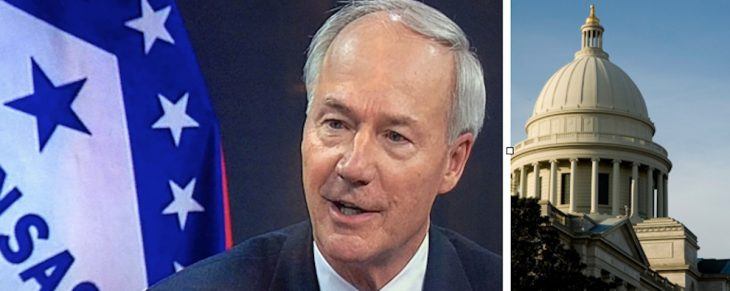Gov. Hutchinson: Use tobacco funds for waiting list of developmentally disabled
by September 13, 2016 4:55 pm 174 views

Gov. Asa Hutchinson believes the state should use $8.5 million in unallocated tobacco settlement funds to reduce the number of developmentally disabled Arkansans waiting for services by 500-900.
About 3,000 Arkansans have been on a waiting list – some since 2007 – to receive Medicaid-funded home and community-based services meant to keep them from being institutionalized. The funds would be used to provide for services such as supportive living and adaptive equipment such as wheelchairs.
Hutchinson on Tuesday (Sept. 13) told the Arkansas Tobacco Settlement Commission that, coupled with matching federal funds, the money would create a pool of $29 million to provide services for 500-900 Arkansans. Amy Webb, Department of Human Services spokesperson, later said individuals waiting the longest would be served first.
The funding is from money previously allocated for AR Health Networks, a program that helped small businesses provide health insurance to employees with incomes below 200% of the federal poverty level by subsidizing insurance premiums. That program has not been funded since Dec. 31, 2013, because that population has been served by the private option, the state program that purchases private health insurance using federal dollars through the Affordable Care Act, otherwise known as Obamacare.
The use of the tobacco settlement funding was decided by the Tobacco Settlement Proceeds Act, a voter-initiated act passed in 2000. Changing the formula requires a two-thirds vote of the Legislature. Hutchinson said he was confident legislators would approve the funding.
Senate President Pro Tempore Jonathan Dismang, R-Searcy, said Tuesday he supports the idea but has not talked to other legislators. Speaker of the House Jeremy Gillam, R-Judsonia, said he has not spoken to many members, but those with whom he has spoken seem favorable, said Cecillea Pond-Mayo, the House’s spokesperson.
Hutchinson said reducing the waiting list has been a goal of his, but the state has not had a plan to do so. He said the Tobacco Settlement Commission had asked for a suggestion for how to spend the unallocated money, and DHS Director Cindy Gillespie had approached him about using it to reduce the waiting list.
Hutchinson said the state will continue to try to reduce the waiting list. Asked what he would say to the other waiting individuals, he said, “This is progress. This is hope. It shows the seriousness of the state to address the waiting list, and that once you start whittling down that waiting list, you’re going to move up on it much quicker.”
